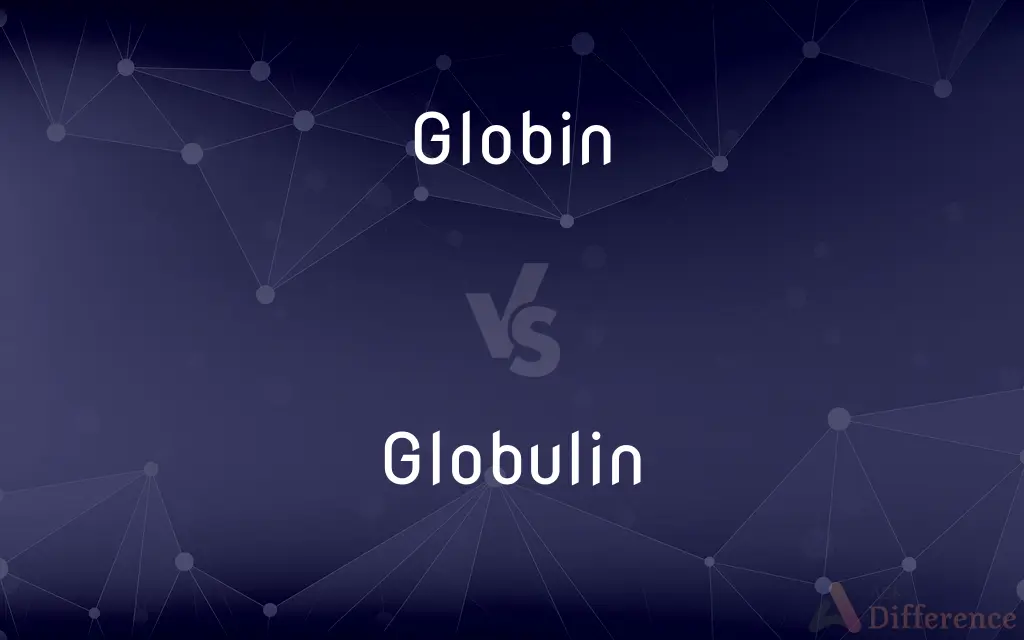Globin vs. Globulin — What's the Difference?
By Fiza Rafique & Maham Liaqat — Updated on March 20, 2024
Globin refers to a family of proteins involved in oxygen transport, while globulin encompasses a broader group of proteins, including antibodies, in blood serum.

Difference Between Globin and Globulin
Table of Contents
ADVERTISEMENT
Key Differences
Globin proteins are integral components of hemoglobin and myoglobin, responsible for oxygen transport and storage in the body. These proteins bind oxygen molecules, facilitating their movement from the lungs to tissues and organs. Globulin, on the other hand, is a broader classification of blood serum proteins that play various roles, including immune response (as antibodies), blood clotting, and carrying hormones, enzymes, and ions.
While globin is primarily associated with the oxygen-carrying function of hemoglobin in red blood cells and myoglobin in muscle cells, globulins are involved in more diverse physiological functions and are classified into alpha, beta, and gamma globulins based on their electrophoretic mobility. Gamma globulins, for instance, are primarily immunoglobulins (antibodies) crucial for immune defense.
The synthesis of globin proteins occurs in the bone marrow, where hemoglobin is produced for red blood cells. In contrast, globulins are synthesized in the liver (except for immunoglobulins, which are produced by plasma cells) and play a part in maintaining osmotic pressure and transporting substances in the bloodstream.
Understanding the distinction between globin and globulin is important in medical diagnostics and treatment, as abnormalities in these proteins can indicate various health issues, such as anemia (low levels of hemoglobin) or immunodeficiencies (abnormal globulin levels).
Both globin and globulin proteins are essential for physiological functions, but their roles, structure, and the systems they influence within the body are distinct, reflecting the complexity and specialization of proteins in biological processes.
ADVERTISEMENT
Comparison Chart
Primary Function
Oxygen transport and storage
Immune response, blood clotting, transport
Location
Hemoglobin in red blood cells, myoglobin in muscles
Blood serum
Types
Alpha and beta globin chains in hemoglobin
Alpha, beta, and gamma globulins
Synthesis
Bone marrow (for hemoglobin)
Liver and plasma cells (for antibodies)
Medical Relevance
Associated with conditions like anemia
Linked to immune function and blood disorders
Compare with Definitions
Globin
Key component of hemoglobin, carrying oxygen.
The globin in hemoglobin binds oxygen in the lungs for transport.
Globulin
Includes antibodies for immune response.
Gamma globulins are essential for fighting infections.
Globin
Essential for red blood cell function.
Hemoglobin's globin chains are critical for red blood cell efficacy.
Globulin
Some globulins are involved in clotting.
Certain globulins activate clotting factors to prevent excessive bleeding.
Globin
Part of myoglobin, supporting muscle oxygen storage.
Myoglobin's globin content helps muscles store oxygen for energy.
Globulin
Carry hormones, vitamins, and metals.
Binding globulins transport hormones like thyroxine throughout the body.
Globin
Low levels can indicate anemia.
Reduced globin production can lead to various forms of anemia.
Globulin
Abnormal levels can signal health issues.
Elevated globulin levels may indicate diseases like multiple myeloma.
Globin
Made of polypeptide chains.
Hemoglobin consists of two alpha and two beta globin chains.
Globulin
Classified by movement in an electric field.
Alpha, beta, and gamma globulins are separated based on electrophoresis.
Globin
The globins are a superfamily of heme-containing globular proteins, involved in binding and/or transporting oxygen. These proteins all incorporate the globin fold, a series of eight alpha helical segments.
Globulin
The globulins are a family of globular proteins that have higher molecular weights than albumins and are insoluble in pure water but dissolve in dilute salt solutions. Some globulins are produced in the liver, while others are made by the immune system.
Globin
Any of a group of heme-containing proteins, including myoglobin and hemoglobin, that can bind oxygen and other gases.
Globulin
Any of a class of proteins that are widespread in blood plasma, milk, muscle, and plant seeds and that are insoluble in pure water but soluble in dilute salt solutions. Blood serum globulins are divided into several groups, including the alpha, beta, and gamma globulins.
Globin
(protein) Any globular protein that incorporates a lang=en.
Globulin
The protein fraction of blood serum containing the globulins; serum globulin.
Globin
(protein) One of several polypeptides that are the protein components of haemoglobin or myoglobin.
Globulin
(protein) Any of a group of simple proteins, soluble in water only in the presence of salts, that are coagulated by heat
Globin
A colorless protein obtained by removing heme from hemoglobin; the protein part of hemoglobin.
Globulin
An albuminous body, insoluble in water, but soluble in dilute solutions of salt. It is present in the red blood corpuscles united with hæmatin to form hæmoglobin. It is also found in the crystalline lens of the eye, and in blood serum, and is sometimes called crystallin. In the plural the word is applied to a group of proteid substances such as vitellin, myosin, fibrinogen, etc., all insoluble in water, but soluble in dilute salt solutions.
Globin
A colorless protein obtained by removing heme from hemoglobin; the oxygen carrying compound in red blood cells
Globulin
A family of proteins found in blood and milk and muscle and in plant seed
Common Curiosities
How are globin and globulin levels measured?
Globin levels are often inferred through hemoglobin measurements, while globulin levels can be measured directly in blood serum using techniques like electrophoresis.
Can globin or globulin levels be modified through diet or supplements?
While diet and supplements can impact overall protein levels and health, specific globin and globulin levels are more directly influenced by factors like genetic conditions, overall health, and medical treatments.
Can globin function independently of hemoglobin?
While globin chains are integral to hemoglobin's structure, their primary function relates to their role within the hemoglobin molecule, and they do not function independently in oxygen transport.
Are all globulins involved in the immune response?
Not all globulins serve immune functions; while gamma globulins are primarily antibodies, alpha and beta globulins have other roles like transport and clotting.
Are there genetic disorders associated with globin?
Yes, disorders like thalassemia and sickle cell anemia result from mutations in globin genes affecting hemoglobin's structure and function.
How do changes in globulin levels affect health?
Abnormal globulin levels can indicate various conditions, from infections and immune disorders to liver disease and certain cancers.
Is there a relationship between globin and globulin in the body?
While both are important proteins in the body, they function in different systems and processes, with globin focused on oxygen transport and globulin involved in a wider range of functions, including immunity and transport.
Are there any lifestyle changes that can improve globin and globulin function?
Maintaining overall health through a balanced diet, regular exercise, and avoiding toxins can support the optimal function of all proteins, including globin and globulin.
How do medical professionals use globin and globulin measurements in practice?
These measurements can aid in diagnosing and monitoring conditions like anemia, immune disorders, and liver function, guiding treatment decisions.
Do globin and globulin have any structural similarities?
Despite both being proteins, their structures are tailored to their specific functions, with globin forming part of the hemoglobin complex and globulins varying widely to accommodate their diverse roles.
Can globulin proteins be used as therapeutic agents?
Yes, certain globulin proteins, particularly immunoglobulins, are used therapeutically to treat a range of immune deficiencies and autoimmune conditions.
How do environmental factors affect globin and globulin levels?
Factors like altitude, infections, and chronic diseases can influence globin and globulin levels by affecting oxygen demand, immune responses, and protein synthesis.
Can globin and globulin levels vary significantly between individuals?
Yes, levels can vary based on individual health, genetic factors, and environmental influences, highlighting the need for personalized medical assessment.
What ongoing research is focused on globin and globulin?
Research includes exploring new treatments for globin-related genetic disorders, understanding globulin roles in immunity and disease, and developing synthetic globins for medical use.
Share Your Discovery

Previous Comparison
Asteroid vs. Comet
Next Comparison
Dubbing vs. KnightAuthor Spotlight
Written by
Fiza RafiqueFiza Rafique is a skilled content writer at AskDifference.com, where she meticulously refines and enhances written pieces. Drawing from her vast editorial expertise, Fiza ensures clarity, accuracy, and precision in every article. Passionate about language, she continually seeks to elevate the quality of content for readers worldwide.
Co-written by
Maham Liaqat













































